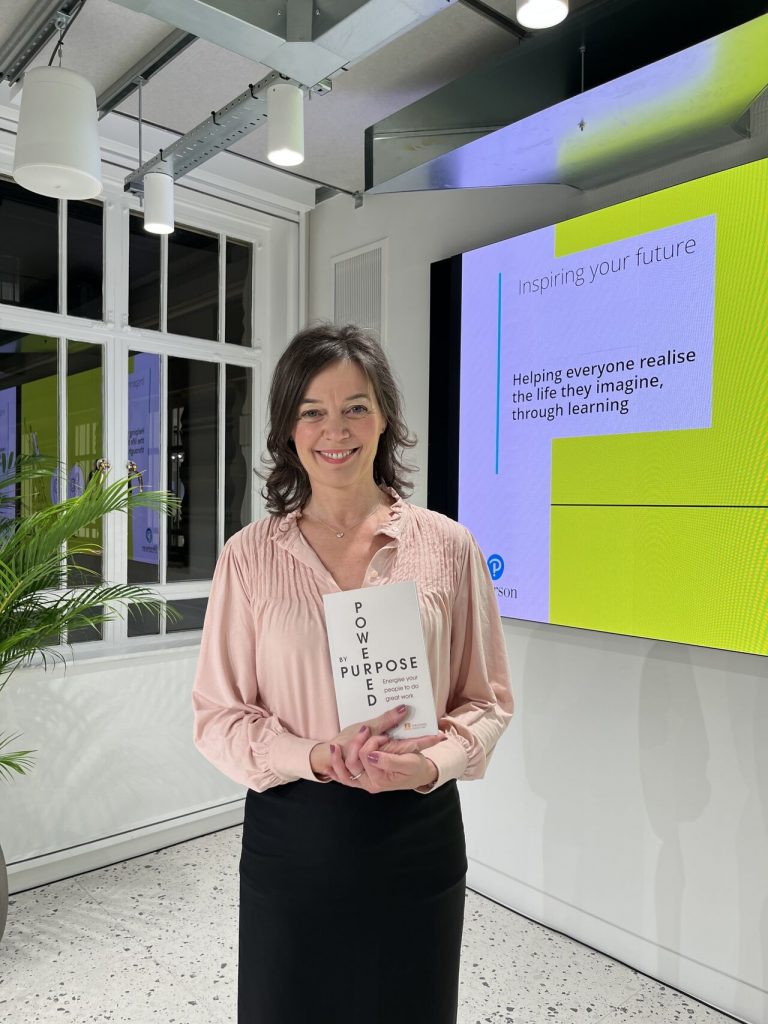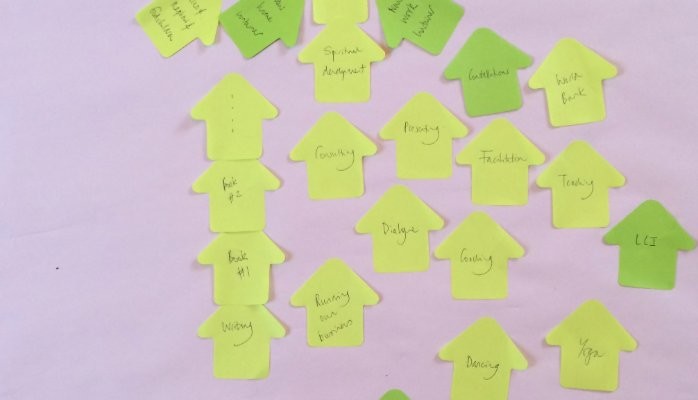
Finding your true work takes time, perseverance and focus.
This post explores the three key reasons why we get stuck in the wrong career – and what we can do to overcome these obstacles. Several suggestions are given to help you to get out of a career you’ve outgrown and to attune to what is uniquely yours to do.
Acknowledgement: I am grateful to Ed Rowland of the Whole Partnership for our conversations about purposeful work. This post has emerged out of our shared insights and ideas.
* * *
“Is this it?”
My client lent back in his chair and tucked his arms behind his head. His question about life, or even Life, felt like a big one. Here was a man who seemed to have it all: the successful career, the beautiful wife and children, the large family home and executive car. He even had the good looks to boot.
“Is there more to life than this?”
It sounded like the line of a song but I knew he was being serious. We’d met to discuss how some coaching might be able to support him in taking the next step in his leadership. Our talk, however, flowed where it will. Given that this was our ‘chemistry meeting’, I was keen to understand what made him tick.
“Am I the only person in the world who just can’t stick with his job, go home, collect a pay cheque and see that as the way life is?”
“It sounds like you think there’s a piece of your life missing?”
“I had this profound moment recently”, Martin said. “I realised I’d be 40 years old in four years time. I want to be able to look back and feel that I made a difference.
There was a pause while I let that sink in.
“I want to feel that I really lived.”
* * *
There is an intrinsic human need for a meaningful, purposeful life.
Once our material needs are satisfied, we hunger for a deeper experience of life, and of ourselves. However, many of us don’t always recognise this need and push it away. We keep ourselves busy, we convince ourselves that we’re content with life as it is and we tell ourselves that it would be pointless to try to make a change anyway.
This is until something jolts us out of our denial. We might wake up one morning and realize that the life we’re leading isn’t the life we want. A difficult conversation with a colleague makes us admit that our career is grating on our nerves. A repeat project brings home the message that our work stifles our creativity. We may reach a “snapping point” or simply be worn down by the daily grind of routine, repetition and resentment.
No one, however, typically teaches us how to reconfigure our lives and careers to reflect what we are really interested in. There are no lessons at school, in the office or on the factory floor about how to tune into who we truly are. No one has usually ever asked us: What are you really about? What do you want? What would you love to do?
Finding our true path in our work is a challenge that many of us long to meet.
We yearn to bring our passion to our work, but think we lack the resources to do this. We want to take a leap into the unknown but worry about what we might find when we land. We feel the pull of some other direction deep in our hearts but sense that it might be too hard to swing.
What stops us from making a move
In a Harvard Business Review article entitled “How to Stay Stuck in the Wrong Career”, Herminia Ibarra, Professor of Organisational Behaviour at INSEAD, highlights how successful career transitions take time, perseverance and hard work. Based on her research, it takes an average of three years for someone in mid-career to make a successful career transition – and many never make it. She identifies three main obstacles to find fulfilling work:
- Firstly, we make heroic efforts but they turn out to be futile. We go to an event and try to “work the room”, thinking that networking is the key. We take up a position because our “CV logic” says it would be a good move. We seek the advice of friends, family and colleagues but they are more invested in us staying as we are rather than making a change.
- We have a faulty mental model about how change works. All too often we adopt what Ibarra calls a “Plan and Implement” model of change, thinking that we need to know with certainty where we’re going before we make a move. Our false belief that there is only one door to our future – if only we could find the key! – stops us from taking any action.
- Finally, we get stuck in our heads. We might create a fantasy job in our daydreams that doesn’t exist in the first place or wouldn’t actually suit us. We keep trying to excavate our destiny rather than seeing that we might discover more about who we are by acting into a new way of being.
What then can be done? Here are seven suggestions to help you attune to your unique work.
1. Listen to your heart
Our feelings and emotions are a valuable bellwether for sensing where our future path might lie. Experiencing emotional churn is a sure sign that change is “up”.
“I’m not sure what sort of journey I am on but a rollercoaster seems a fair comparison!” Martin wrote in an email to me.
His chronic frustration at how change was being handled in his current organization and how forceful he was finding his boss were strong indicators that some action needed to be taken. Alongside this, Martin was also feeling the “pull” to be his own boss and call the shots. His enthusiasm for setting up his own company was indicative of what his emerging future was calling him to do.
Stepping into your future often means getting out of denial. Tell yourself the hard truths about your situation. If you’re exhausted, admit it to yourself. If your home life is suffering because your job now takes up all your waking hours, be clear about this. If you know your heart has gone out of your work, take action!
2. Start close in
The hardest part of making any change is getting started. We need to actively create momentum to get going. Take a good look at the field of possibilities and feel into where there’s resonance – and resistance. As the poet David Whyte puts it:
Start close in,
don’t take the second step
or the third,
start with the first
thing
close in,
the step
you don’t want to take.
After several coaching conversations Martin decided to make a weekend project of running his own business. In an ideal world, he’d have liked to have made a bigger splash – resigned, changed country, taken a year’s sabbatical – but with a wife and young family to support, he felt cautious about making such a sweeping change.
We need to value small steps such taking on a temporary assignment or a piece of pro bono work to see how it fits us. Ibarra calls this the “Test and Learn” model of change. It’s about learning through doing rather than trying to have everything figured out before we make our next move.
3. Find your place in the wider ecosystem
Finding our passion is crucial for finding our true work – and there is another piece of the puzzle. We might have a passion for whipped cream but without connecting this to meeting some need in the marketplace, we are unlikely to find the deeper fulfillment we seek.
The sweet spot is where our passion meets the needs of others. When we find what is uniquely ours to do, it both makes us come alive and it serves others too. Attuning to our true work is not about being self-absorbed; it is about plugging into the wider systems in which we live and work.
To find his way out of a career that he’d outgrown, Martin asked himself which customers his existing company wasn’t serving well. He identified a niche market that was looking for high-end publications. With his many years experience in the publishing industry, Martin knew that he could create an offer that these discerning customers would love. It also excited him – a sure sign that he was finding his path.
4. Search out your community
Be careful when sharing the first tender shoots of a new dream with people you know. They might, unwittingly, kill your idea with a clumsy comment or careless, “Do don’t really see yourself doing that, do you?!”
To nurture your gradually emerging sense of direction, seek out a new community. Who energises you to be around? Where might a new professional community lie? Who could open doors to new worlds for you?
Taking a training programme in dialogue back in 2000 was a key turning point in my own career. It paved the way for a different kind of conversation. I met change agents, consultants and next generation leaders who were searching for new ways to disturb and perturb persistent patterns in interactions. After attending that 3-day event, my career forked down a different path entirely. The on-going support from fellow travellers on the road has been invaluable.
5. Change your story
When we feel we’re on an emotional rollercoaster, it might seem as if everything is falling apart. Where, however, might it all be coming together? Be willing to dig deep and look for coherence in where life might be leading you. What is the larger narrative at work?
In my mid-twenties after spending 4 years working as a street circus performer in Spain, I thought I’d burnt all my bridges professionally. Having graduated in psychology with flying colours, my CV now had a huge gap. I wondered who’d ever be willing to employ me. When I found out that there were 5,000 psychology graduates emerging every year, I felt even more down. Years later, however, I started to see how all those years learning how to pull a crowd, entertain a crowd and then pass the hat was an amazing apprenticeship for being a corporate consultant.
Creating what Ibarra calls a new “working identity” does not emerge overnight. It takes time to tell ourselves – and others – a different story about who we are and who we might become. Reworking our life story may involve revisiting defining moments that only make sense with hindsight.
In my own story, I have come to cherish the moment that I decided to leave behind my identity as a traveller and step back into mainstream society as a psychologist. Once I’d found my feet, I came to appreciate how my years on the road gave me the strength to carve out an unconventional career as a dialogue consultant.
6. Cultivate a practice
Sustaining change is a tricky nut to crack. We know from the research on coaching that it is much more effective when a client focuses on changing just one or two things at a time rather than a scattergun approach. Work out where to put your energy and apply this consistently.
Finding a simple way to support yourself as you move through change can make a huge difference. One client I worked with carved out an hour for herself on a Monday morning where she’d go to a coffee shop and do the strategic thinking that she knew would get squeezed out of the rest of the week.
Another client made it a daily habit to walk outside during daylight hours to help him reflect on his progress and review his goals. A further client took an 8-week course in mindfulness and then practiced deep-belly breathing for 15 minutes on a daily basis. As a result, she felt calmer and better able to cope with navigating a demanding career transition.
7. Embrace the unknown
Our path to finding our true work is not linear or logical. It may involve cul-de-sacs, U-turns and bends in the road. The unexpected can play its part too. After leaving his 20 year career in publishing, Martin sent me a note in the first week of setting up his own company:
“It’s exciting and I am already dealing with a shareholder disagreement!”
I could sense Martin’s enthusiasm at meeting this new challenge. He had followed his heart and was well resourced, with abundant energy levels, to deal with the differing views of his stakeholders about the new business.
Our next true move has what my colleague Ed Rowland calls a “felt sense of rightness” about it. When we find it, we must take it. Otherwise we’re at risk of asking, “Is this it?”
Interested to know more?
Sarah Rozenthuler, together with Ed Rowland of the Whole Partnership, will be running a 3-day programme Bring Your Unique Work to Life on 8 – 10 July in London:
http://wholepartnership.com/wp-content/uploads/2013/07/Purpose-Programme-flyer-2015.pdf





